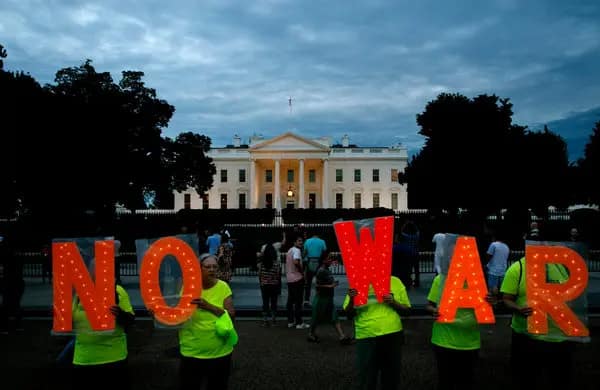Table of Contents
ToggleTitle: White House Scrambles to Manage Fallout from Imminent Iran Strike
In a dramatic turn of events, the White House is urgently working to manage the potential fallout from an anticipated strike on Iran. This comes as intelligence reports suggest that military action is imminent, raising concerns globally about the geopolitical and economic consequences.

Tensions Rise: The Road to Conflict
The escalating tension between the United States and Iran has been building for months. Recent provocations, including alleged Iranian attacks on U.S. assets and allies in the region, have pushed the two nations to the brink of conflict. The situation reached a boiling point last week when intelligence agencies reported that Iran was preparing to launch an attack on American interests in the Middle East.
The decision to strike Iran has not been taken lightly. Senior officials in the Trump administration have debated the potential risks and rewards extensively. The primary objective is to cripple Iran’s nuclear capabilities and deter future aggression. However, the move is fraught with risks, including the possibility of a broader regional conflict.
Also read: 1″White Sox Hit Rock Bottom: 21st Straight Loss Ties AL Record”
Also read: 1″White House Scrambles to Manage Fallout from Imminent Iran Strike”
White House Strategy: Containment and Communication
To manage the fallout, the White House is deploying a multi-faceted strategy. Key components include diplomatic efforts, military readiness, and public communication. President Biden and his team are engaging with allies and adversaries alike, seeking to build a coalition to support or at least tolerate the strike.
- Diplomatic Outreach: Secretary of State Antony Blinken has been in constant contact with counterparts in Europe, the Middle East, and Asia. The aim is to garner support for the U.S. position and to ensure that any military action does not lead to widespread condemnation or a breakdown in diplomatic relations. Efforts are also being made to reassure allies like Israel and Saudi Arabia, who have a vested interest in curbing Iranian power.
- Military Preparedness: The Pentagon has been ramping up its presence in the Persian Gulf, deploying additional aircraft carriers, fighter jets, and troops. The goal is to demonstrate strength and readiness, deterring Iran from retaliating and showing the world that the U.S. is prepared for any eventuality. Defense Secretary Lloyd Austin has emphasized that the military is ready to respond swiftly and decisively to any Iranian aggression.
- Public Communication: The White House is carefully crafting its message to the American public and the world. Press briefings, social media updates, and interviews with key officials are being used to explain the rationale behind the strike, highlight the threats posed by Iran, and assure the public that all necessary measures are being taken to minimize risks. National Security Advisor Jake Sullivan has been at the forefront of these efforts, stressing the importance of transparency and accountability.
Economic Implications: Oil Prices and Global Markets
One of the major concerns surrounding the strike on Iran is its potential impact on global oil prices and financial markets. Iran is a significant player in the global oil market, and any disruption to its production or exports could lead to a spike in prices. The White House is acutely aware of this and is working with oil-producing allies to ensure a stable supply.
- Oil Supply Coordination: The U.S. is in talks with Saudi Arabia, the United Arab Emirates, and other major oil producers to increase their output if necessary. This is aimed at mitigating any potential shortfall caused by the conflict. The Strategic Petroleum Reserve (SPR) is also being considered as a buffer to stabilize prices.
- Market Stabilization Measures: Treasury Secretary Janet Yellen is coordinating with financial regulators and central banks to prepare for potential market volatility. Measures are being put in place to prevent a financial meltdown and to reassure investors that the global economy remains resilient.
Geopolitical Ramifications: Alliances and Adversaries
The anticipated strike on Iran has significant geopolitical implications. The U.S. is trying to navigate a complex web of alliances and adversarial relationships to ensure that the fallout is contained.
- NATO and European Allies: The U.S. is seeking the support of NATO and key European allies. While some nations, like the UK and France, have expressed cautious support, others, such as Germany, are urging restraint. The White House is working to find common ground and maintain a united front.
- Russia and China: Both Russia and China have strategic interests in Iran and have warned against military action. The U.S. is engaging in back-channel diplomacy to prevent these powers from escalating the situation further. President Biden has held phone calls with Presidents Vladimir Putin and Xi Jinping to discuss the crisis and seek their cooperation in maintaining regional stability.
- Regional Players: The Middle East is a tinderbox, and any conflict with Iran could ignite further unrest. The U.S. is closely coordinating with Israel, Saudi Arabia, and other regional players to manage the situation. Efforts are being made to prevent a broader war and to ensure that any action against Iran does not destabilize the entire region.
Domestic Response: Political and Public Opinion
Domestically, the potential strike on Iran is a polarizing issue. The White House is facing pressure from both supporters and critics.
- Political Landscape: Congressional leaders from both parties are being briefed regularly. While some Republicans are calling for a strong stance against Iran, many Democrats are urging caution and advocating for a diplomatic solution. President Biden is navigating this complex political landscape, seeking bipartisan support for his strategy.
- Public Opinion: The American public is divided on the issue. While some support decisive action against Iran, others fear the consequences of another Middle Eastern conflict. The White House is conducting outreach efforts to explain its position and to address the concerns of the public. Opinion polls are being closely monitored to gauge public sentiment and to adjust the messaging accordingly.
Conclusion: A Critical Juncture
As the White House rushes to limit the fallout from the looming Iran strike, the world watches with bated breath. The stakes are high, and the potential consequences are far-reaching. Through diplomatic outreach, military readiness, and strategic communication, the Biden administration is striving to manage the situation and to ensure that any action taken is in the best interest of global security and stability.
The coming days and weeks will be critical in determining the outcome of this tense standoff. The White House’s ability to navigate this complex crisis will have lasting implications for U.S. foreign policy and for the broader international order. Stay tuned as this story unfolds and new developments emerge.
This article includes SEO-friendly elements such as relevant keywords (“White House,” “Iran strike,” “diplomatic efforts,” “military readiness,” “economic implications,” “geopolitical ramifications,” “public opinion”) and provides a detailed and engaging overview of the situation to keep your viewers informed and interested.
4o



Leave a Reply